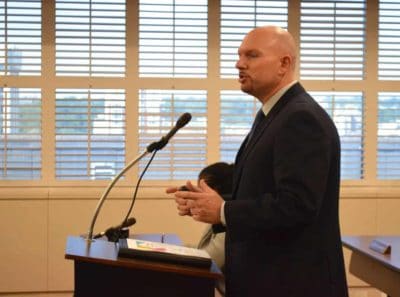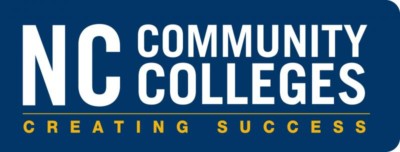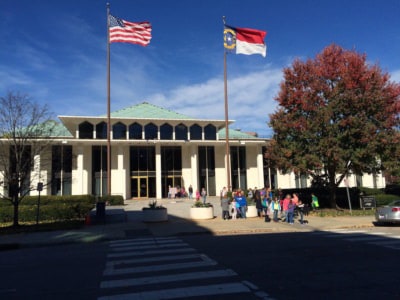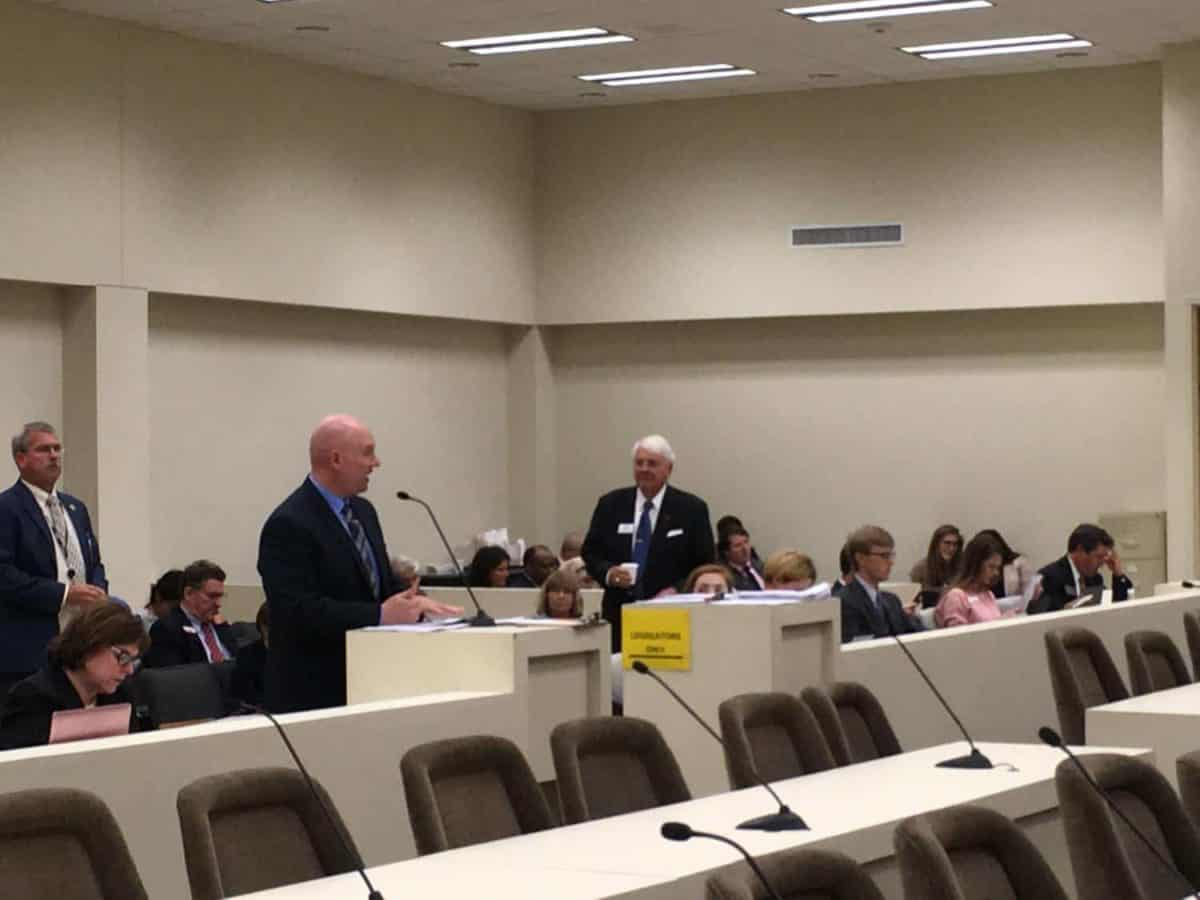
The budget may be sitting on the desk of Governor Roy Cooper, awaiting his signature, but that doesn’t mean the work of the General Assembly is done. Lawmakers took up a number of laws Monday and Tuesday, including a bill that allows four Charlotte-Mecklenburg district towns to open their own charter schools and legislation that would force schools to put up a sign that says “In God We Trust.”
Town Charter School Bill
The action got started Monday night when the Senate took up its final vote on House Bill 514, which allows the towns of Cornelius, Huntersville, Mint Hill, and Matthews to open up their own charter schools and give residents of their towns preference for enrollment. All four schools are served by the Charlotte-Mecklenburg School District, and proponents say they are simply trying to grant the desire of these towns with this bill.
This bill has been the cause of a great deal of controversy. First, critics have called it precedent-setting as towns have never been allowed to operate their own charter schools. Furthermore, some say the enrollment preference granted these schools subverts the traditional expectation that charter schools don’t pick favorites when it comes to which students to take. Also, some lawmakers expressed concern that the bill would allow these mostly-affluent towns to reimpose segregation in their localities.
But perhaps the biggest source of anguish for critics was the finance piece. Under the constitution, towns aren’t allowed to use property tax for school-related purposes without a referendum. They also can’t take on debt for school-related purposes, meaning these towns would have to shoulder the burden of building new charter schools out of their own pockets.
A provision put in the budget allows municipalities to use property taxes for schools and relieves residents of such municipalities of any school-related debt liability. That provision was aimed directly at solving the problems presented in House Bill 514. Critics say the budget provision amounts to a huge sea-change in education funding in North Carolina.
Before the debate got started Monday night, an amendment was put forth that stripped a provision that allows teachers at these potential town charter schools from opting into the state’s health and retirement plans. That was a provision added to the bill in committee, but after hearing that it might make the bill a statewide bill, Sen. Dan Bishop, R-Mecklenburg, sent forth the amendment.
The bill is supposed to be a local bill, meaning it pertains to a particular locality and has limited impact.
Bishop’s amendment ended up being a bridge too far for Sen. Jerry Tillman, R-Randolph, who has said in previous debates on the bill that he didn’t think it was a good idea for towns to run their own charters, but if they wanted to, he would let them.
Monday he said, “I made the mistake of voting for it one time. I’m not going to make it a second time.”
In fact, five Republicans voted against the bill, though it ultimately passed 27-18. The bill goes back to the House now. See the vote count below.
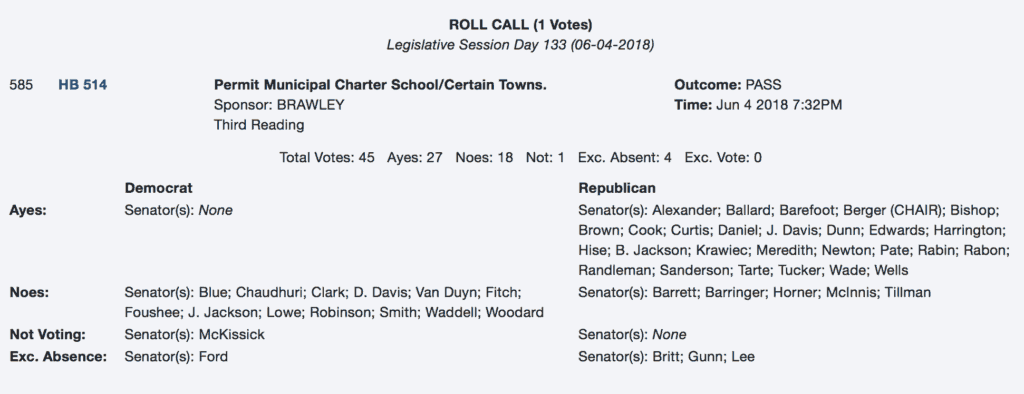
School Safety Bill
The House took up a school safety bill Monday night that would require peer-to-peer support programs at all schools with grades higher than 6th, require annual facility vulnerability assessments for school buildings, require annual reports on school resource officers as well as make sure those officers receive training, and more.
House Bill 938 passed in a unanimous vote, but not before Democrats tried to amend it to include a number of gun control measures. Those amendments were ultimately ruled out of order by House Speaker Tim Moore, R-Cleveland.
Tuesday House Education Committee
The House K-12 education committee took up three education related bills Tuesday, including bills to “clarify and make permanent” reporting requirements on cursive writing and multiplication table memorization in schools, and a bill that would force schools to display a sign saying “In God We Trust.” A third bill “An Act to Provide for Teachers Allotments for Geographically Isolated K-12 Schools,” was stripped of its language and replaced with various changes to the Innovative School District school law.
Those changes include removing the language that lets schools who choose another reform model — such as Restart — be exempt from consideration for the ISD, lifting the five-school cap on the ISD, and changing a provision that would have forced Innovation Zone schools into the ISD if they didn’t exceed academic growth in the last two years of their five-year term in the Innovation Zone.
To review, the Achievement School District bill was passed during the 2016 General Assembly short session. At the heart of the legislation is the creation of a district which will eventually include five low-performing schools from around the state. The schools, which are yet to be named, could be turned over to for-profit charter operators. Right now, one school in Robeson County has been chosen and will open next school year.
The legislation establishing ASDs also gave districts that participate the opportunity to pick up to three other low-performing schools in their districts to join an Innovation Zone. Schools in this zone would have charter-like flexibility but would continue to be managed by the school district.
Last year’s budget tweaked the ASD program slightly, changing its name to the North Carolina Innovative School District (ISD). It also added a provision that says if a district participating in the ISD has more than 35 percent of its schools identified as low-performing, then all of those schools could become part of an Innovation Zone should the district elect that option.
A separate portion of the ISD bill, not relating to the ISD, allows local boards of education in certain small districts to contract with the spouse of a superintendent.
House #nced is underway. We're about to talk about the bill that requires schools to put up a sign that says "In God We Trust," in schools. #ncga
— Alex Granados (@agranadoster) June 5, 2018
Rep. Bert Jones says that ACLU says the bill is divisive. Says if you agree with the ACLU, then vote against this. He says he does not agree with the ACLU Offering amendment to delay implementation of bill by five months #nced #ncga
— Alex Granados (@agranadoster) June 5, 2018
Amendment delaying implementation five months passed #nced #ncga
— Alex Granados (@agranadoster) June 5, 2018
Rep. Corbin says, "In God we Trust," is the national motto. Putting it up in schools isn't trying to impose religion on anyone, it's being put up because it's the national motto. #nced #ncga
— Alex Granados (@agranadoster) June 5, 2018
Rep. Brockman says he shares the concerns of the ACLU and others. "That it breaks our first amendment rights. We have the right to believe whatever religion we want." Also says we have the right to believe nothing if we want #nced #ncga
— Alex Granados (@agranadoster) June 5, 2018
Rep. Bert Jones: Says when you see the phrase "In God We Trust," nobody is compelling you to believe in God. "We are displaying this phrase, and I would add our state motto as well, and we are simply saying this is our national motto." #nced #ncga
— Alex Granados (@agranadoster) June 5, 2018
Bill making schools display national motto, "In God We Trust," in schools, passed the House #nced committee #ncga
— Alex Granados (@agranadoster) June 5, 2018
Cursive and Multiplication Tables
Next bill on multiplication table and cursive writing reporting requirements. PCS adds that students who get a level five on end of year math tests will be placed into advanced math classes the following year #nced #ncga
— Alex Granados (@agranadoster) June 5, 2018
Rep. Hurley says previous reports on multiplication tables and cursive writing lessons in schools did not provide #ncga the info they needed. This bill clarifies the reporting requirement. #nced #ncga
— Alex Granados (@agranadoster) June 5, 2018
Rep. Blackwell on advanced math class PCS: "There is a tremendous amount of data to show that students who are challenged can rise to the occasion and actually raise their performance." "We ought to be pleased that we are giving these students that opportunity."#nced #ncga
— Alex Granados (@agranadoster) June 5, 2018
Rep. Graig Meyer: "It's moving quickly, but it's a very good thing to do." On putting students who score a level five on end of year math tests into advanced math classes the following year #nced #ncga
— Alex Granados (@agranadoster) June 5, 2018
Multiplication table, cursive writing reporting bill, with PCS on advanced math classes, passed House #nced committee with nobody opposed #ncga
— Alex Granados (@agranadoster) June 5, 2018
ISD Bill
Isolated schools bill was changed to address various items related to the Innovative School district and allows local boards of education to contract with the spouse of the superintendent of a local school administrative unit in certain cities and counties #nced #ncga
— Alex Granados (@agranadoster) June 5, 2018
Bill would let schools that have adopted a reform model qualify for ISD. Previously, these kinds of schools would not qualify. Removes cap of five schools starting in 2021-22 school year if schools in ISD have been successful. Meaning ISD will expand #nced #ncga
— Alex Granados (@agranadoster) June 5, 2018
Various other more minor changes to the ISD law, including letting the ISD superintendent have final approval on choosing of principal #nced #ncga
— Alex Granados (@agranadoster) June 5, 2018
This bill also changes part of the ISD law that would forc low performing schools in innovation zone to join the ISD if they did not exceed expected growth in the last two years of their five years in I-zone. Now, they don't have to join the ISD. They "may." #ncga #nced
— Alex Granados (@agranadoster) June 5, 2018
The innovation zone is a zone where schools can have charter like flexibility. A certain amount of schools in a district that has an ISD school can join the Innovation Zone. #nced #ncga
— Alex Granados (@agranadoster) June 5, 2018
Rep. Mike Clampitt, who represents Haywood, Jackson, Swain, says in smaller school systems there are situations where superintendent's wife could be a teacher. Current law dictates that is a conflict of interest. A section of this bill would allow #nced #ncga
— Alex Granados (@agranadoster) June 5, 2018
Under this bill, if a superintendent wants to hire his or her spouse for whatever reason, the local school board has to sign off #nced #ncga
— Alex Granados (@agranadoster) June 5, 2018
Rep. Meyer asked Rep. Elmore why the bill dropped the part of the bill that says if a school has adopted a reform school model it is exempt from being considered for the ISD #nced #ncga
— Alex Granados (@agranadoster) June 5, 2018
Rep. Meyer wants to know why that change is being made. Rep. Elmore says there is no end to restart model, one of the reform models, so there is no accountability. There is no end point to the model #nced #ncga
— Alex Granados (@agranadoster) June 5, 2018
Rep. Meyer wants to know why five-school cap is being removed from the ISD law #nced #ncga
— Alex Granados (@agranadoster) June 5, 2018
ISD Superintendent Eric Hall: "Over the next 2 years, we will be at the full 5." That leaves 2 years in the Pilot program's duration where there will be no more schools chosen, he said. if ISD schools successful, this says up to two more schools per year can be added #nced #ncga
— Alex Granados (@agranadoster) June 5, 2018
Rep. Meyer says the provision saying if you enter a reform model you're not eligible for ISD is a carrot. This bill originally had a carrot and a stick. Take care of your school yourself with reform model, or we take care of it with ISD #nced #ncga
— Alex Granados (@agranadoster) June 5, 2018
Rep. Meyer says cap shouldn't be lifted because we don't know yet how the ISD program is working #nced #ncga
— Alex Granados (@agranadoster) June 5, 2018
Being able to select up to two more schools per year is an option, not a requirement, ISD Superintendent Eric Hall says #nced #ncga
— Alex Granados (@agranadoster) June 5, 2018
Rep. Elmore: "your check is the state board itself in making that decision." On adding additional schools above the five to the ISD. State Board gets say so on adding more schools. #nced #ncga
— Alex Granados (@agranadoster) June 5, 2018
ISD bill passes the House #nced Committee #ncga
— Alex Granados (@agranadoster) June 5, 2018
Other Media Reports
Here’s a rundown of other media reporting on education issues in recent days.
News & Observer
NC parents can soon use 529 plans to pay for K-12 private school costs
Getting students through the UNC system to graduation is the goal of new effort
If a teacher showed a movie in class, legislators would know about it under proposed bill
NC Health News
Rural Broadband Highlighted in the State Budget
The Virginian-Pilot
School building, officer mandates clears N Carolina House
WRAL
House OKs court redistricting, elections, school safety bills
Gun advocates call out legislative leaders over arming teachers


